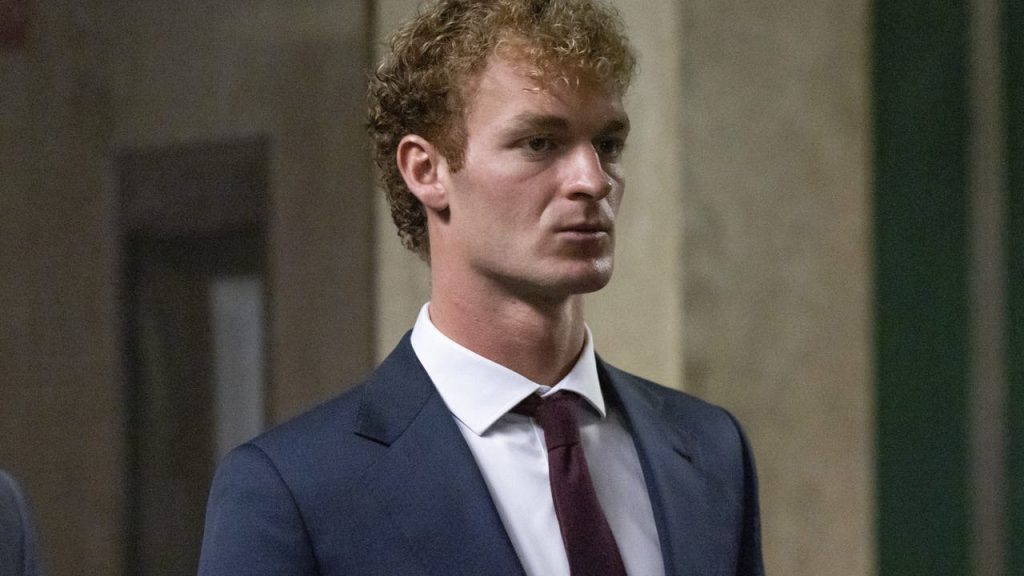Closing arguments in Daniel Penny trial
Closing arguments began in the trial of Daniel Penny, a Marine veteran charged with recklessly choking to death homeless man Jordan Neely last year on a New York City subway.
NEW YORK (AP) – A defense lawyer asked jurors to put themselves in the shoes of frightened subway riders as closing arguments began Monday in the trial of a Marine veteran charged with choking an irate, homeless man to death after an outburst on a New York underground train.
Daniel Penny claims he acted in self-defense against threatening behavior when he put Jordan Neely in a chokehold on May 1, 2023. Penny has pleaded not guilty to manslaughter and criminally negligent homicide.
Defense attorney Steven Raiser told jurors to imagine they were on that train when Neely got on, “filled with rage and not afraid of any consequences.” Witnesses said Neely shouted about being willing to die, willing to go jail or — as Penny recalled — willing to kill.
“You’re sitting much as you are now, in this tightly confined space. You have very little room to move and none to run,” defense attorney Steven Raiser told jurors.
“Danny acted to save those people,” he added.
Prosecutors will have their chance to address the jury later.
Penny’s reaction to Neely touched raw nerves and fueled debate about race relations, public safety, urban life and different approaches to crime, homelessness and mental illness.
Some in New York and around the country see Penny, a 26-year-old Marine veteran turned architecture student, as a valiant protector of fellow subway riders who feared the erratic Neely was on the verge of violence. Others view Penny as a white vigilante who summarily killed a Black man who was in need of help.
Neely, 30, once was among the city’s corps of subway and street performers and was known for his Michael Jackson impersonations. But after his mother was violently killed when he was a teenager, Neely was diagnosed with depression and schizophrenia, was repeatedly hospitalized, struggled with drug abuse and had a criminal record that included assault convictions.
During the monthlong trial, the anonymous jury heard testimony from subway passengers who witnessed the roughly six-minute chokehold, as well as police who responded to it, pathologists, a psychiatric expert, a Marine Corps instructor who taught Penny chokehold techniques and Penny’s relatives, friends and fellow Marines. Penny chose not to testify.
Defense rests in Daniel Penny trial without his testimony
The defense in Daniel Penny’s manslaughter trial has rested its case without Penny taking the stand. FOX 5’s Linda Schmidt has the story.
Jurors watched videos recorded by bystanders and by police body cameras and saw how Penny explained his actions to officers on the scene and later in a stationhouse interview room.
“I just wanted to keep him from getting to people,” he told detectives, demonstrating the chokehold and describing Neely as “a crackhead” who was “acting like a lunatic.”
“I’m not trying to kill the guy,” he insisted.
Multiple witnesses said Neely shouted about needing food and something to drink, whipped his jacket to the floor and started screaming. They differed in descriptions of his movements and whether they were threatening. Several passengers said they were alarmed, and some were thankful when Penny subdued Neely.
City medical examiners ruled the chokehold killed Neely. A pathologist hired by Penny’s defense contradicted that finding.
Prosecutors say Penny intended to protect people but used too much force, indifferent to the human life he was holding in his arms. Prosecutors have noted the veteran continued to grip Neely’s neck after the train stopped and anyone who wanted to get out could do so, after bystanders urged Penny to let go, and even after Neely had been still for nearly a minute.
Daniel Penny leaves the courtroom for a lunch break in New York, Monday, Nov. 18, 2024. (AP Photo/Yuki Iwamura)
The defense contends Penny held on because Neely tried to break loose at points and that the pressure on the man’s neck wasn’t consistent enough to kill him.
“He applied what he learned as a U.S. Marine in a less aggressive way than he was taught,” Raiser told jurors. He contended that Penny wanted only to hold Neely for police, and so used a “simple civilian restraint” instead of a “textbook chokehold” that would be applied to render someone unconscious.
Officers arrived 12 minutes after starting to receive 911 calls about the struggle in the stopped train, Raiser noted.
He also emphasized the defense pathology expert’s testimony that Neely was killed by a variety of factors but not the chokehold.

